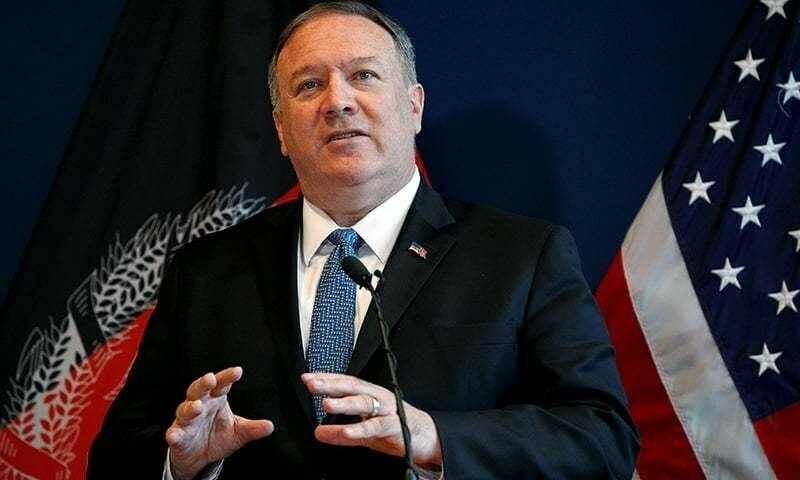NEW DELHI: Former US secretary of state Mike Pompeo has revealed that India and Pakistan came close to nuclear war in 2019 following the Balakot airstrike, and that US intervention helped prevent an escalation, the Press Trust of India and AFP reported.
In Feb 2019, India launched airstrikes inside Pakistani territory after blaming a militant group for a suicide bombing that killed 41 paramilitary soldiers in Indian-held Kashmir. Pakistan then shot down an Indian warplane, capturing the pilot.
“I do not think the world properly knows just how close the India-Pakistan rivalry came to spilling over into a nuclear conflagration in February 2019,” Mr Pompeio wrote in Never Give an Inch, the memoir of his time as Donald Trump’s top diplomat and earlier CIA chief.
According to the former US diplomat, he was awakened to speak to his then-Indian counterpart Sushma Swaraj, who told him that Pakistan was preparing for a nuclear attack in the wake of the air strike and India was preparing its own escalatory response, the Press Trust of India quoted him as saying.
In memoir, ex-Trump admin official says American teams in India, Pakistan convinced both sides no attack was imminent
Quoting from his book, Mr Pompeo said that the incident took place when he was in Hanoi for the US-North Korea Summit on February 27-28 and his team worked overnight with both New Delhi and Islamabad to avert this crisis.
“I will never forget the night I was in Hanoi, Vietnam when – as if negotiating with the North Koreans on nuclear weapons wasn’t enough – India and Pakistan started threatening each other in connection with a decades-long dispute over the northern border region of Kashmir,” he added.
“In Hanoi, I was awakened to speak with my Indian counterpart. He believed the Pakistanis had begun to prepare their nuclear weapons for a strike. India, he informed me, was contemplating its own escalation. I asked him to do nothing and give us a minute to sort things out (sic),” he wrote in his book, which wrongly refers to Ms Swaraj as “he”.
“I began to work with Ambassador (then National Security Advisor John) Bolton, who was with me in the tiny secure communications facility in our hotel,” he said, adding that he spoke to “the actual leader of Pakistan”, then army chief General Qamar Javed Bajwa.
“As one might expect, he believed the Indians were preparing their nuclear weapons for deployment. It took us a few hours – and remarkably good work by our teams on the ground in New Delhi and Islamabad – to convince each side that the other was not preparing for nuclear war,” the 59-year-old top former American diplomat wrote.
There was no immediate comment from India’s Ministry of External Affairs or Pakistan’s Foreign Office on Mr Pompeo’s claims.
“No other nation could have done what we did that night to avoid a horrible outcome. As with all diplomacy, the people working the problem set matter a great deal, at least in the short run,” he said. “My most senior diplomat, David Hale, had also been the US ambassador to Pakistan and knew that our relationship with India was a priority,” Mr Pompeo said.
“General McMaster and Admiral Philip Davidson, the head of what came to be renamed the US Indo-Pacific Command, understood India’s importance, too,” he said.
“Although often frustrated by the Indians, US trade representative Robert Lighthizer – a brilliant trade negotiator and a Bob Dole staff alumnus, making him a near-Kansan – was a great partner working to deepen economic ties. We all shared the view that America had to make a bold strategic effort to tighten our ties with India and break the mould with new ideas,” PTI quoted Mr Pompeo as writing.
According to AFP, Mr Pompeo writes extensively in the book about his diplomacy with Kim Jong Un, which included preparing three meetings between the young totalitarian leader and Donald Trump. He recalled a chilling first conversation as he flew into Pyongyang in March 2018 on a clandestine trip as CIA director.
“I didn’t think you’d show up. I know you’ve been trying to kill me,” Pompeo quotes Kim as telling him.
“I decided to lean in with a little humor of my own: ‘Mr. Chairman, I’m still trying to kill you.’” But Mr Pompeo described a budding understanding with Kim as the Trump administration offered incentives to lower tension.
Published in Dawn, January 25th, 2023
















































Dear visitor, the comments section is undergoing an overhaul and will return soon.